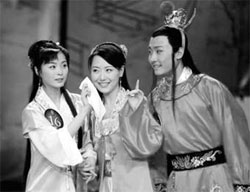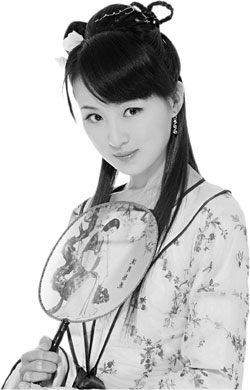Dream girl
Casting contestants for A Dream of Red Mansions play the leading roles during a live TV broadcast. |
Wu Ting is in a contest which doubles as a reality show, tracking the casting for one of the most visible television dramas in the country. It is the remake of A Dream of Red Mansions (well, the giant backdrop in the show uses "chamber" for "mansion"), the highest-regarded fictional work in Chinese literature. Wu covets the female lead, Lin Daiyu.
Thousands of teenage girls and young women had the same dream. But in the past six months, most of them have been winnowed out. The shortlist is down to a dozen now.
Casting shows is by no means a Chinese phenomenon. It is part of the television contest craze sweeping across the globe, led by American Idol. The casting for the stage musical The Sound of Music also made headlines in the United Kingdom. Contestants yearn to be stars before the show in question starts production.
However, not every contest show has the same ability to mold nobodies into celebrities. In China, only Season Two of Supergirls was an unqualified success, turning three young women into instant superstars. The Dream, produced by Beijing Satellite Television, has been lukewarm because it eschews sensationalism.
Wu Ting, 24, is one of the strongest candidates for the lead female role, Lin Daiyu. |
The most daunting challenge facing Wu Ting and her fellow contestants is an earlier version, premiered in 1987 and aired repeatedly ever since. Audience perception is so entrenched that they have difficulty accepting anybody else playing these same roles. Chen Xiaoxu, the actress who played in the older version, recently "escaped to the hollow gate of Buddhism" by becoming a nun, and her story turned more heads than the casting show.
"My portrayal of Lin Daiyu, if I win, will be different from that of Chen Xiaoxu. Every actress has her own unique approach," Wu said just before a recent live broadcast.
If Wu sounded like a professional, she is. Wu is not one of those girls who wished upon a star and then found herself in the spotlight. She has had the acting bug for much of her adult life.
When Wu was a teenager, she enrolled in a local opera school in her hometown in East China's Anhui Province. But sensing that television and movies offered better opportunities, she enrolled in the Central Drama Academy in Beijing, the cradle that gave rise to Gong Li and Zhang Ziyi.
But most people who come out of the school become budding actors rather than superstars. "The life of a Northern drifter is not easy," sighed Wu, referring to the army of young men and women which some say is 250,000-strong who stay in Beijing to pursue acting jobs.
Of course, the ivy-league education helps. In 2003, she secured her first gig, in which she played the role of the female lead opposite some star performers in a drama series. "It was the time of the SARS epidemic. Living in Beijing was a bit surreal. People avoided public transport, and having no money to buy a car, I had to ride a bicycle to get around town."
She used the money from that gig to pay off her student loan, but she also became a little superstitious, because a fortuneteller said she would suffer some kind of fracture. On the day the production wrapped up, she sprained her ankle.
As a matter of fact, her parents also had a foreboding premonition of the incident. "Life is mysterious. You win some, you lose some," she said, philosophically.
The casting couch scandal that erupted in China's entertainment industry last year has essentially turned every struggling actress into a suspect of moral compromise. When asked about this, Wu laughed: "I'll tell you my biggest humiliation."
For one project, the director was not willing to offer the fee that Wu bargained for. The difference was a negligible 100 yuan ($13). During the final meeting, he dragged her to a place near the restroom. Fearing what would happen, she tried to muster her courage to fight back.
"He stood against the wall, struck this model-like pose and held out one hand. 'You're not hired, and give back the script', he told me to my face," Wu recalled.
It was not that she failed to get the role, but rather the way she was turned down that made her feel bad. "I audition for all kinds of projects, but the average success rate is about one in eight or nine. I'm already numb. Getting work is, first of all, not about art, but about feeding myself."
Wu has already climbed up from the bottom rung of the hierarchy. She has made a total of eight drama series; unfortunately, only half of them aired. "Well, once I finish shooting, it's beyond my control how or whether it comes out."
Nowadays, she participates in two series a year, which takes up two-thirds of her time. "I've bought an apartment in Beijing. I'm no longer struggling for survival. But if I could be a second- or third-tier actress, I'd have bigger and better roles. In that sense, I still consider myself a Northern drifter."
But in the eyes of some of her fellow contestants on the current show, she already has a career. "When they ask me for acting tips, I'm put in a quandary. If I advise them, some may feel I'm superior; if I don't, they may think I'm arrogant."
In the end, she shares her opinion, but with a caveat and only when the acting coach is unavailable.
What will a pro get out of such a publicized casting process?
"It's a learning experience," she said. "Besides, it gains exposure for me. I'm not a sociable person, and I live in my own world while not working."
Contrary to outside perception, those on the show are fully aware of who the stronger contenders are, she said. "But as a show, it has elements of surprise. You never know whether you can survive the next episode, because the judges may not see your strength. All I can do is do my best."
The elusive nature of the profession has affected her. Her last three projects have something in common: the title has the word "dream" in it. First, it was My Youth, My Dream, then Chasing Dreams, and this time around, A Dream of Red Mansions.
Wu Ting said that by now, she has concluded that, "People say this line of work is a dream factory. It's very true. I'm constantly going after my dream."
(China Daily 04/19/2007 page20)
















